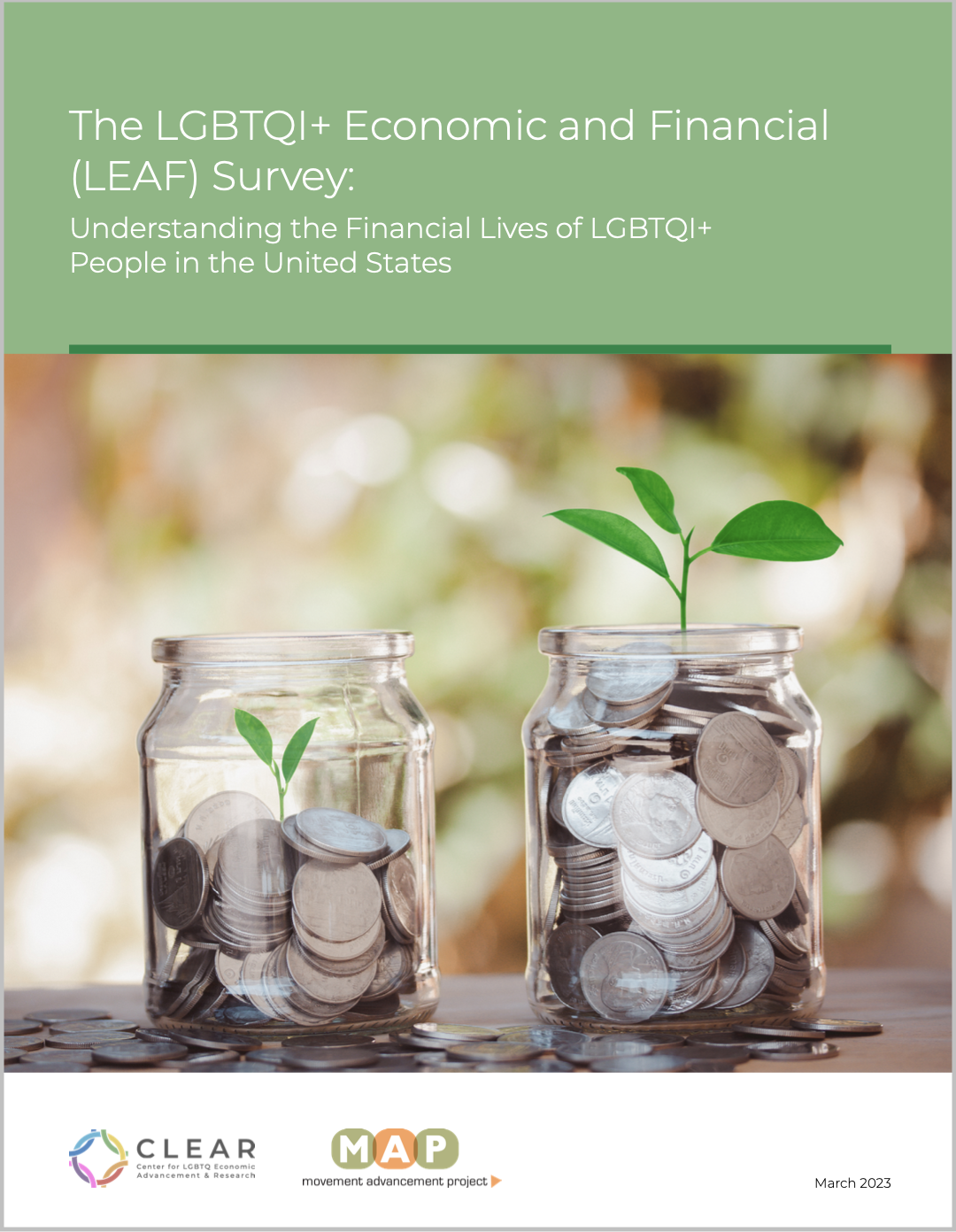MEDIA CONTACT: Rebecca Farmer, Movement Advancement Project
rebecca@mapresearch.org | 303-578-4600 ext 122
March 29, 2023
The LGBTQI+ Economic and Financial (LEAF) Survey: Understanding the Financial Lives of LGBTQI+ People in the United States, released today, shines new light on the financial experiences and issues faced by lesbian, gay, bisexual, transgender, queer, and intersex (LGBTQI+) people in the U.S. The report fills in critical gaps left by many federal and financial industry surveys that fail to include LGBTQI+ demographics. The report is authored by the Center for LGBTQ Economic Advancement & Research (CLEAR) and the Movement Advancement Project (MAP). The report analyzes results from a survey of 2,505 LGBTQI+ and 503 non-LGBTQI+ adults, conducted from December 2022 to January 2023. Respondents were asked about their financial well-being, priorities and concerns, experiences with exclusion and discrimination, and costs associated with family formation, gender-affirming health care, or legally changing their name or gender marker. Some key findings include: - LGBTQI+ people reported losing the ability to rely financially on their families after coming out. While 73% of LGBTQI+ respondents said they could rely financially on their family before telling them about their sexual orientation, only 62% could do so after coming out. The gap was even greater for transgender respondents.
- Over half (53%) of all LGBTQI+ respondents had taken out a federal student loan to finance their education, versus 31% of non-LGBTQI+ respondents. Among borrowers, only 23% of LGBTQI+ borrowers had paid off their loans versus 39% of non-LGBTQI+ borrowers.
- Four in ten parents (40%) reported having some out-of-pocket legal costs related to family formation. Additionally, 43% of LGBTQI+ parents had spent $1,000+ on out-of-pocket healthcare costs for family formation; nearly a third (32%) had spent $5,000+.
- Most respondents who received gender-affirming care (82%) reported spending some money out-of-pocket. Nearly half (46%) of people who had received gender-affirming care spent $5,000+ out-of-pocket; one-third (33%) had spent at least $10,000 out-of-pocket.
- LGBTQI+ people were more likely to report negative feelings about their finances than positive ones. Roughly twice as many LGBTQI+ respondents as non-LGBTQI+ respondents reported feeling anxious, overwhelmed, and depressed about their finances.
- One in ten LGBTQI+ respondents (11%) said they had experienced discrimination in banking or financial services.
"The LEAF report reveals the immense financial pressure many LGBTQI+ people in the U.S. are living under—particularly transgender people and queer people of color. The findings illustrate the urgent need for improvements in the financial industry and in state and federal policies to support the economic needs of LGBTQI+ people and communities who are struggling financially," said Spencer Watson, Executive Director at CLEAR. "These new findings show the wide-ranging economic impacts of discrimination on LGBTQI+ people. This underscores the urgent need for strong and decisive efforts to counteract this financial toll and other harms. Especially given the escalating political attacks on LGBTQI+ and especially transgender people, federal protections against discrimination are essential," said Logan Casey, Senior Policy Researcher and Advisor at MAP. The full report is available at www.mapresearch.org/leaf-survey-report. #####
CLEAR is a nonprofit that creates research, education, and advocacy to support the financial needs of LGBTQ people, organizations, and communities and to help them achieve their unique economic goals.
MAP is an independent think tank that provides rigorous research, insight, and analysis that help speed equality for all, including lesbian, gay, bisexual, transgender, and queer people.


